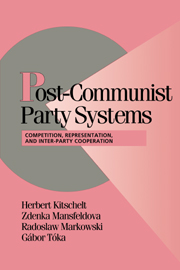Book contents
- Frontmatter
- Contents
- List of Figures and Tables
- Acknowledgments
- Introduction: Democracy and Party Competition
- Part I Theory: Party Systems and the Procedural Quality of Post-Communist Democracy
- Part II Setting and Research Strategy
- 3 From Communist Rule to Democracy: Four Central and East European Countries
- 4 Empirical Research Strategy
- Part III The Structuring of Party Competition
- Part IV Political Alignments and Dimensions of Competition
- Part V Political Representation and the Quality of Democratic Governance
- Conclusion
- Appendix I List of Political Parties and Electoral Alliances
- Appendix II Questionnaire for the Elite Study
- Appendix III Population Survey Questions (Policy Opinions)
- Bibliography
- Index
- More Titles in the series
4 - Empirical Research Strategy
Published online by Cambridge University Press: 05 June 2012
- Frontmatter
- Contents
- List of Figures and Tables
- Acknowledgments
- Introduction: Democracy and Party Competition
- Part I Theory: Party Systems and the Procedural Quality of Post-Communist Democracy
- Part II Setting and Research Strategy
- 3 From Communist Rule to Democracy: Four Central and East European Countries
- 4 Empirical Research Strategy
- Part III The Structuring of Party Competition
- Part IV Political Alignments and Dimensions of Competition
- Part V Political Representation and the Quality of Democratic Governance
- Conclusion
- Appendix I List of Political Parties and Electoral Alliances
- Appendix II Questionnaire for the Elite Study
- Appendix III Population Survey Questions (Policy Opinions)
- Bibliography
- Index
- More Titles in the series
Summary
Our principal research tool is a survey among politicians of just about all electorally relevant parties in Bulgaria, the Czech Republic, Hungary, and Poland. We conducted the pilot study with politicians at the national level (legislators, party executives, and secretaries) throughout 1993. Our main study in winter–spring 1994 targeted middle-level politicians and party functionaries in four regions of each country. The time points of pilot and main study are sufficiently close to each other to let them serve as mutual validity checks for each other. Future research should multiply the time points of observation and increase the intervals between each measurement in order to capture dynamic change in the party systems. We supplement our elite study by population survey data to explore the correspondence of elite and voter positions and perceptions of the political landscape. In this chapter we explain the design of our empirical instrument and introduce technicalities of the elite survey analysis.
SURVEYING EXPERTS OR POLITICAL ELITES
Studies of party elites are rather uncommon in the empirical literature on party competition and they have proceeded along two different avenues. On the one hand, researchers have surveyed party politicians, such as convention delegates, candidates for legislative office, or legislators, and compared their policy positions with those of their voters. On the other, political scientists have asked panels of academic experts on individual countries or entire regions to rate party positions on a left-right scale (e.g., Castles and Mair 1984).
Information
- Type
- Chapter
- Information
- Post-Communist Party SystemsCompetition, Representation, and Inter-Party Cooperation, pp. 133 - 154Publisher: Cambridge University PressPrint publication year: 1999
